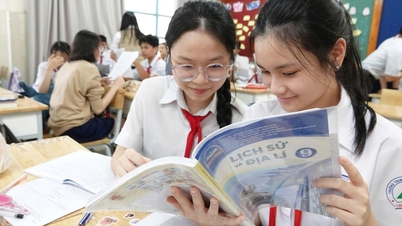China tests 3 subjects, Japan and Korea do not test
According to the synthesis of the Quality Management Department, China organizes a unified high school graduation exam nationwide in the provinces, taking place in 2-3 days, the exam questions are chaired by the Ministry of Education and Training; provinces can base on the content scope prescribed by the Ministry of Education and Training to organize their own exam questions.

High school graduation exams in Vietnam are tending to propose only 2 compulsory subjects and 2 elective subjects.
China organizes three compulsory exams, including: math, Chinese (language and literature like Vietnamese literature), English and one optional subject of natural science or social science.
Exam format: multiple choice combined with essay; exam results are used to consider high school graduation and are considered by universities and colleges when enrolling students.
In Korea, students do not have to take a national exam to graduate from high school like many other countries in the world . High schools issue certificates confirming that students have completed the high school program and are recognized as high school graduates.
Japan also does not hold a national high school graduation exam. The recognition of high school graduation is the responsibility of the high school.
Russia does not have multiple choice tests, France has both tests and exams
The Ministry of Education and Training also mentioned the exam organization methods of some typical European countries such as Russia and France.
In Russia, the Unified State Exam is the basic form of assessment of 11th grade graduates (high school graduates, as the Russian general education system only has 11 years) for schools on the territory of the Russian Federation.
The exam is held with two compulsory subjects: Russian and mathematics. Other subjects are chosen by students from history, social sciences, literature, physics, computer science - information and communication technology (ICT), chemistry, biology, geography, English, German, French and Spanish.
The Russian and math exams do not have multiple choice exercises . The foreign language exam has a section that requires test takers to listen to a recording in a foreign language and answer questions based on the content of the listening.
In France , the high school graduation exam is held nationwide (baccalaureate). The baccalaureate exam begins at the end of grade 11 and ends at the end of grade 12, but the exam format has many changes.
Since June 2021, the baccalaureate exam has been conducted with compulsory exams, including: literature, philosophy, 2 subjects of interest chosen by the student and a 20-minute presentation exam (students will present on a topic chosen and prepared from grade 11 until the end of grade 12), taken at the end of spring of grade 12.
The graduation assessment in France is as follows: regular assessments account for 40% of the total graduation score, of which 10% is calculated from the final score of the 11th and 12th grades and 30% comes from the scores of the 2 general tests (one in 11th grade and one in 12th grade). The general tests are selected by each school based on the general set of questions of the Ministry of Education and Training. The final exams account for 60% of the total graduation score.
America gradually abolishes graduation exams
The Bureau of Quality Management cited information from the Washington Post (2017) saying that the number of US states that have abandoned the high school graduation exam is gradually increasing. In 2015, 21 out of 50 states maintained the high school graduation exam policy; among them, Florida, Texas, California and New York. However, 2 years later (2017), only 13 states remained; by 2018, only 12 states remained.
The tests used also vary widely. Most of these 12 states administer and design their own statewide standardized tests, but some states, such as Mississippi and New Jersey, allow students to take tests administered by professional testing organizations instead, such as the ACT and SAT.
In some of these states, students have multiple options for earning a diploma, including submitting a proof of education application.
If you want to enter university or college, schools only consider the scores of 6 grade 12 subjects (scores of previous grades are not counted) and some other conditions.
The trend of compact exams
From the synthesis of the methods of organizing high school graduation exams in the above countries, the Department of Quality Management believes that: clearly there is no single right or wrong answer for the forms of high school exams, but each method needs to serve (effectively) the purpose of the national education system.
However, there is one thing in common in the above mentioned countries, which is the method of examination and recognition of high school graduation in a streamlined direction; ensuring that students have access to careers, choose careers suitable to their abilities and interests, conditions and circumstances to continue studying, learning a trade and evaluating the teaching and learning process and other purposes.
At this time, although October is almost over, the Ministry of Education and Training has not yet announced a plan to reform the high school graduation exam from 2025 corresponding to the reform of the 2018 General Education Program.
Previously, in early October 2023, according to the results of synthesizing opinions on the number of subjects for this exam plan of the Ministry of Education and Training, nearly 60% of teachers' opinions in a number of localities participating in the survey (Ho Chi Minh City, Long An, Tay Ninh, Lang Son and Bac Giang) proposed that the high school graduation exam from 2025 will only test 4 subjects including 2 compulsory subjects: literature and math, plus 2 optional subjects from the remaining subjects studied in grade 12 (including foreign languages and history).
According to the Ministry of Education and Training, the above number of exam subjects has 3 advantages: reducing exam pressure for students, reducing costs of money and time for students' families and society (candidates only take 4 subjects compared to the current 6 subjects); does not cause imbalance between admission combinations, helping students spend time studying subjects suitable for their career orientation; candidates can choose 2 optional subjects to promote their strengths, have favorable exam results to be considered for admission to higher education institutions.
Source link



![[Photo] Students of Binh Minh Primary School enjoy the full moon festival, receiving the joys of childhood](https://vphoto.vietnam.vn/thumb/1200x675/vietnam/resource/IMAGE/2025/10/3/8cf8abef22fe4471be400a818912cb85)
![[Photo] Prime Minister Pham Minh Chinh chairs meeting to deploy overcoming consequences of storm No. 10](https://vphoto.vietnam.vn/thumb/1200x675/vietnam/resource/IMAGE/2025/10/3/544f420dcc844463898fcbef46247d16)

































































































Comment (0)